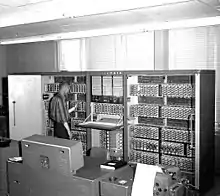Datatron
The Datatron is an obsolete family of decimal vacuum tube computers developed by ElectroData Corporation and first shipped in 1954. The Datatron was later marketed by Burroughs Corporation after Burroughs acquired ElectroData in 1956. The Burroughs models of this machine were still in use into the 1960s.[1]

History
Consolidated Electrodynamics Corporation (CEC), ElectroData's parent corporation, first pre-announced the Datatron in 1952 as the "CEC 30-201".[2] Known also as CEC 30-203 (ElectroData 203), ElectroData 204 or 205, Burroughs 205 (different names signify the development and addition of new peripherals).
The first systems were equipped with an "Electrodata 203" processor and were shipped to the Jet Propulsion Laboratory (JPL)[3] and the National Bureau of Standards (NBS) in 1954. That same year design began on the "30-240" processor, enhanced to support magnetic tape. The name "Datatron" was first used in 1955.[4]
Description
The Datatron has a word size of ten decimal digits plus a sign. Character data occupies two digits per character. A magnetic drum is used for memory. The drum rotates at 3570 rotations per minute (RPM) and stores 400010 words on 20 tracks (called bands).[5] It weighed about 3,175 pounds (1.6 short tons; 1.4 t).[6] A later model, the Burroughs 220, added a small amount of magnetic core memory.[1] A later model, the Datatron 205 was sold by Burroughs as the Burroughs 205.
References
- Gray, George (April 2001). "The Burroughs 220 Computer". Unisys History Newsletter. 5 (2). Archived from the original on October 8, 2017.
- "MODEL 30-201 ELECTRONIC DIGITAL COMPUTER".
- "Datatron 205". tjsawyer.com.
- Sawyer, T.J. "Burroughs 205 Development Chronology". Tom's Datatron 205 Burroughs 205 HomePage. Retrieved Oct 9, 2017.
- Thelen, Ed. "Burroughs 205". Retrieved Oct 9, 2017.
- Weik, Martin H. (June 1957). "DATATRON". ed-thelen.org. A Second Survey of Domestic Electronic Digital Computing Systems.
External links
- Burroughs Corporation (1956). DATATRON Electronic Data Processing Systems Handbook (PDF).
- Photo of Datatron system at Georgia Institute of Technology in 1959
- ElectroData/Burroughs Datatron 205 Emulator